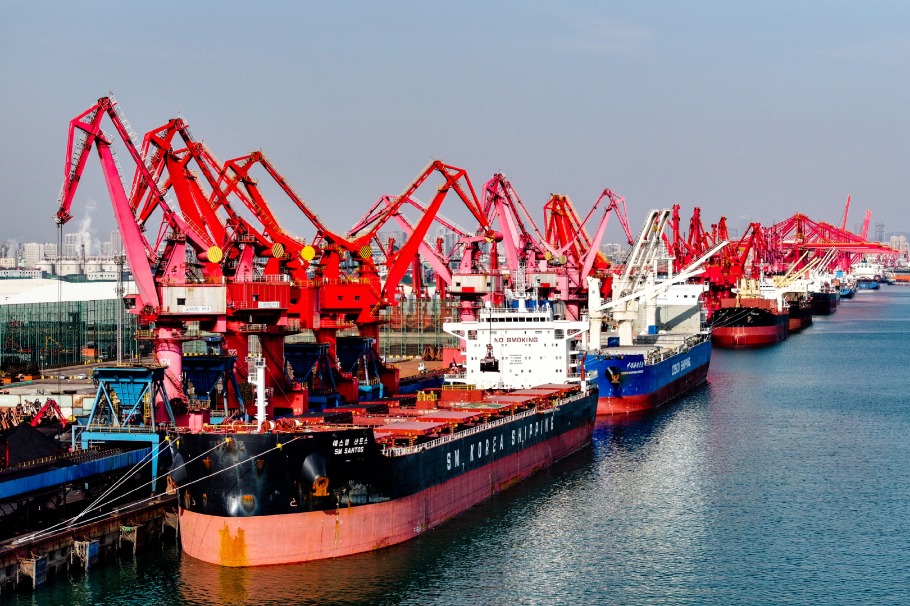Nation to uphold dominant position in shipbuilding market


China will continue to uphold its dominant position in the global shipbuilding market this year, leveraging its robust supply chain capabilities and focusing on intelligent and green advancements, market watchers and shipbuilders said on Monday.
Chinese shipyards have made significant strides in advancing their manufacturing technologies, particularly in high value-added segments, they said, adding that the country has demonstrated its capability in building various types of vessels — such as mega container ships, cruise liners and car carriers — and adopted green fuels, seizing more market share than its South Korean and Japanese rivals.
Their comments came as the latest data showed that China maintained its top position in the global shipbuilding market last year, with strong growth in both output and new orders.
China's shipbuilding output reached 42.32 million deadweight tons in 2023, a year-on-year increase of 11.8 percent, according to figures released on Monday by the Ministry of Industry and Information Technology. The output accounted for 50.2 percent of the global total.
Also in 2023, new orders surged 56.4 percent year-on-year to 71.2 million deadweight tons, accounting for 66.6 percent of the global total, the data showed.
Li Yanqing, secretary-general of the Beijing-based China Association of the National Shipbuilding Industry, noted that China is now capable of building all major types of vessels found worldwide.
The country has essentially bridged the technological divide with South Korea and Japan in the construction of high value-added ships, such as liquefied natural gas carriers and offshore wind turbine installation vessels, he said.
Li Yunbo, a professor at Shanghai Maritime University, said that China's shipbuilding industry "has shifted toward domestic self-reliance, especially in core technologies, components and new materials". This strategy has effectively shortened the time taken for building ships and reduced project costs, he said.
Chinese shipyards have also transformed this ability into a notable advantage. By sourcing materials locally, they have stimulated the growth of their industrial chain and enhanced profitability, he added.
Jiang Hongliang, head of the production management department at Dalian Shipbuilding Industry Co in Liaoning province, said the shipyard currently takes around 180 days to build a very large crude carrier.
Previously, it took shipbuilders, both domestic and foreign, about a year to accomplish the task, he said, adding that the company, which is a subsidiary of Shanghai-based China State Shipbuilding Corp, has taken the lead globally in this regard.
According to the Beijing-based China Machinery Industry Federation, the shipbuilding industry is characterized by its complexity, extensive supply chain and strong industrial connections, encompassing more than 50 diverse industries such as steel, nonferrous metals, machinery and electronics.
Last year, New Dayang Shipbuilding Co in Yangzhou, Jiangsu province, received more than 60 orders from domestic and overseas clients for installing its self-developed marine intelligent energy efficiency management systems on ships.
Chen Herong, the company's executive vice-president, said, "Since industrial big data analysis, machine learning and other intelligent technologies can be applied to optimize the daily operation of ships, we increased investment in smart manufacturing to drive innovation and cultivate new growth points."
Currently, New Dayang Shipbuilding has orders for building 59 vessels, including bulk carriers and chemical tankers. Its production for foreign trade orders is scheduled through 2026, data from Nanjing Customs showed.
In response to the growing global market demand for new ships, Han Jianfeng, president of the China unit of Wartsila Corp, a Finnish ship engine manufacturer, said the company will produce more dual-fuel and methanol-powered marine engines, and plans to add new production lines at its plants in China in the years ahead.
By the end of December, the Chinese shipbuilding industry's holding orders reached 139.39 million deadweight tons, marking a significant year-on-year increase of 32 percent. This volume accounted for a substantial 55 percent share of the global market.




































